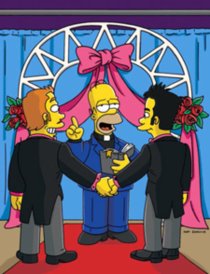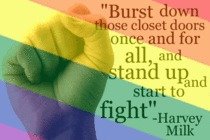 When the reverend Ted Haggard was outed four years ago, it was in a ball of biblical hellfire—crystal meth! Gay sex! Unholy massages! Banished from the church he founded, he was forced to wander the Arizona desert selling insurance. Now Pastor Ted returns with his wife by his side, a new church, and a more open theology. Is he chastened? Somewhat. Straight? Hmm. Ready for a second coming? Well, here's the complete interview by Kevin Roose from the latest issue of GQ.
When the reverend Ted Haggard was outed four years ago, it was in a ball of biblical hellfire—crystal meth! Gay sex! Unholy massages! Banished from the church he founded, he was forced to wander the Arizona desert selling insurance. Now Pastor Ted returns with his wife by his side, a new church, and a more open theology. Is he chastened? Somewhat. Straight? Hmm. Ready for a second coming? Well, here's the complete interview by Kevin Roose from the latest issue of GQ.It takes only a couple of minutes from the moment we enter the gas station for someone to recognize him. A biker in a leather jacket and a black knit cap spots him as he approaches the register, does a quick double take, and then comes over to ask the same question everyone asks.
"Pastor Ted! How you been?"
"Doing well! Doing well!" Ted says, shaking the stranger's hand. "I can't see who you are under there. What's your name?"
The biker lifts his hat, introduces himself as Robert. He used to listen to Ted preach at New Life years ago, he says, back before everything happened.
"Well, it's good to see you, Robert! Thank you for saying hello."
"I hope everything works out for you."
"Thank you!" Ted says, flashing his toothy, rectangular smile. "You know one of the advantages of my story? It can't get worse!"
Ted turns back to the cashier, twenty-ounce Mountain Dew in his hand.
"Are people being friendly to you today?" he asks her. Her face flushes as it all becomes clear; she nods.
"Great to hear!" Ted says, and bounds into the bright October day.
Ted likes it here in Colorado Springs, the place where he served for twenty-two years as pastor of New Life Church, a congregation with 10,000 members and a Six Flags–sized campus on the north side of town. He doesn't go there anymore, of course. But he's constantly bumping into former parishioners like Robert, and he enjoys telling them about his comeback—that four years after the scandal that destroyed his career, made him a national punch line, and got him temporarily banished from the state, he's moved back home, kept his family together, and started a new church. It feels good to be here, he says, to show the cynics a real-life resurrection.
He founded the new church, St. James, last summer, naming it after the apostle who said, "Faith without works is dead." The purpose of the church, Ted announced to a small cluster of reporters assembled in his yard, would be to help others struggling through their seasons of crisis. "I don't judge people anymore. I know life happens to everybody. Sometimes it's self-imposed, other times it's imposed from the outside," he said. "But I think we're qualified to hold people's hands when they go through that."
The question of whether Ted is in a position to help others—whether he should be helping others—isn't an easy one, even for some of his friends and advisers. "What happened four years ago was a violation," Glenn Packiam, a New Life executive pastor, said when we spoke on the phone last fall. Packiam still considers the Haggards friends, but when I asked if he thought Ted should be back in the ministry, he was careful. "Every person has to discern for themselves whether they can trust him again," he said.
In Ted's mind, though, he's never been more capable, more called, than he is now. He has walked through the fire and emerged with family and faith restored. He's "less broken now," he says, more whole, spiritually and psychologically. This may be true. But "less broken" doesn't necessarily equal "redeemed." And what he's working to repair may not be the sort of thing that can be fixed.
Last spring, Ted's eldest son, Marcus, approached me at a conference where I was speaking about a book I wrote on my semester undercover at the Reverend Jerry Falwell's Liberty University. Marcus surprised me when he suggested that I should talk to his dad: "He almost wrote your book."
Marcus explained that as a teenager, Ted had written for his school paper and hoped to become a journalist. He was accepted to a few college journalism programs, but his dad, a midlife evangelical convert, offered to buy him a brand-new Pontiac LeMans—blue coupe, tan leather seats—if he went to Oral Roberts University instead.
Ted wasn't thrilled about attending school with the Jesus crowd, but a car is a car, so he came up with a plan: He would go to Christian college and write an insider exposé. All of which means, in essence, that Ted and I have one very strange thing in common, and that he would have scooped me by thirty-five years had the Holy Spirit not called him to the ministry after a late-night prayer session in the parking lot outside his sophomore dorm.
A few months later, I called Ted to ask if he would be open to letting me meet with him. He was wary, but after consulting Gayle, his wife of thirty-two years and the closest thing he has to a publicist, he agreed to let me visit. It wasn't until I arrived in Colorado Springs that Ted called to say that plans had changed, that he was going on an overnight camping trip with Elliott and Jonathan, two of his other sons, and that instead of meeting at his home, would I maybe want to tag along?
Ted is a goofily handsome man with sandy-colored hair that he parts on the side like a 1950s school principal. Even when he's the loudest in the room, as is often the case, he's good at creating a quick intimacy, addressing you by name and readily poking fun at himself.
"Kevin, you just have to promise to write about my dashing style," he jokes as we load up the car, glancing down at his too-big New York Giants hoodie and dad jeans.
I follow the Haggards' white Escalade in my rental for two hours, past Eleven Mile Canyon to a lush hilltop clearing overlooking a wide valley.
Almost as soon as we're out of the car, Ted sets out in search of a cell signal. Even though he goes to the mountains several times a month—and even though his phone has software that allows Gayle to track his movements via GPS—he wants to check in, make sure she knows exactly where we are.
"It's my responsibility to rebuild trust," he explains, "since I'm the one who screwed up." Ted talks about the scandal freely, whether asked about it or not, which first seems like the by-product of four years of intensive therapy but may also be a canny way to control the narrative, to preempt others' suspicions and doubts.
When we get back to the campsite, Elliott has already built a fire and raided the cooler Gayle packed. Jonathan, a slight, scraggly-bearded 23-year-old with a developmental disability, piles logs on the ground as he slowly sounds out "fa-ther son camp-out."
Taking in the night, Ted lets out an almost comically long, satisfied sigh. "Our lives have returned to normal," he declares, sliding a marshmallow onto a skewer. "We're starting to do the things we did before, because we're getting a grip on life again."
Elliott, a high school junior with moppish hair and the quiet confidence of a cool-crowd kid, rolls his eyes in a Dad, come onnnnn way. "I don't think our family has a normal anymore," he says.
"Yeah," Ted says, laughing. "It's a pretty dynamic situation."
The air is colder up here than in Colorado Springs, and we huddle around the fire as Ted delivers a series of autobiographical mini-sermons about his childhood in rural Indiana and his time at Oral Roberts. He loved school, even though he now realizes "it was where I was taught that I could pray through my issues instead of getting real help." He tears up talking about this stuff, though he says everything makes him cry these days.
"I cried when the Chilean miners got rescued. I cry when I watch Undercover Boss. I cry at anything that shows people being people. I'm a wreck."
I'd hoped to ask Ted about the new church, but after the kids go to sleep in the Escalade (too cold for tents, they decide), his mood darkens, and for the next few hours, as the fire burns down to nearly nothing, he bitterly runs through everything we all have wrong about him.
He says that despite popular perception, he was never a right-wing power broker in the vein of Jerry Falwell. His reported weekly chats with George W. Bush were usually just briefings with low-level White House staff. He was never a homophobe, either, he says, and though he supported a 2006 amendment outlawing gay marriage in Colorado, he was also in favor of a ballot measure that would have extended domestic-partner benefits to same-sex couples.
When I start to ask about Mike Jones, the escort who exposed him, he cuts me off.
"We never had sex sex," he says, glancing at the car to make sure that Elliott and Jonathan are asleep. "I bought drugs and a massage from him, and he masturbated me at the
 end of it. That's it."
end of it. That's it."But Ted's true sore spot, the thing that drains the life from his voice, is the way he and Gayle were treated by their church in the wake of the scandal. "Here I was, feeling like I'd wasted my life," Ted says. "And they just sent me away."
When Ted resigned from New Life, a board of church-appointed overseers presented him with a separation agreement that required him to cut off all contact with members of the church, stay away from the media, perform no ministry-related work, and move his family out of Colorado. As severance, the church would provide fourteen months' salary for him and Gayle (about $200,000) and assorted other benefits. Ted obediently signed the agreement, but he now believes it was excessively harsh treatment for a family in the midst of a major crisis—especially since, well, isn't providing mercy for sinners sort of the entire point of Christianity?
"I used to think the church was the light of the world," Ted says. "But I've completely lost my faith in it."
Ted's complaints about New Life are old news to anyone who's been following his saga, but tonight, when I ask him if he really means to say completely, he stops and looks at the sky already starting to lighten.
"You've got to understand, Kevin, people are, at their cores, hateful," he says, rising to stamp out the fire's embers and go to bed. "I don't want to believe that, but the facts have prevailed over my idealism."
Ted Haggard has always been a different kind of pastor. When he started New Life in his basement in 1985, he preferred jeans and untucked oxfords to the dark suits and conservative ties of his peers. As the church grew into one of the nation's largest congregations and Ted became president of the 30-million-member National Association of Evangelicals, he broke from the religious right on many of its core axioms.
He was no progressive—he used to say that his only disagreement with George W. Bush was over his choice of pickup truck. (Ted drove a Chevy; Bush was a Ford man.) But he believed in environmentalism, didn't subscribe to young-earth creationism or Left Behind rapture theology, and thought good Christians should read books by Thomas Friedman and Malcolm Gladwell in addition to Matthew, Mark, Luke, and John.
Still, even the skeptics were dumbfounded when, on the eve of the 2006 midterm elections, a Denver television station aired an interview with Mike Jones, revealing that Ted, under the alias "Art from Kansas City," had purchased sex from him and that he'd helped Ted buy crystal meth, over the course of a three-year affair.
Ted initially denied having met Jones, but a few days later he confessed that he was, in fact, Art from Kansas City. In his resignation letter to New Life, he wrote: "The fact is, I am guilty of sexual immorality, and I take responsibility for the entire problem. I am a deceiver and a liar."
Soon after Ted signed the separation agreement, the Haggards began their exile in Phoenix, where Ted took a job as a door-to-door insurance salesman. He attended therapy sessions in which a counselor used a technique called eye-movement desensitization and reprocessing (EMDR) to trace Ted's same-sex urges to having been molested by one of his father's employees at age 7. After just three weeks of EMDR, a member of Ted's advisory committee told The Denver Post that Pastor Ted was "completely heterosexual."
It was the sort of easily mocked, over-the-top statement that Ted might make, but he himself never actually put it in those terms. Ted has been vague about his sexuality since moving back to Colorado Springs in 2008. He says that he still believes the Bible is clear that "homosexuality is not God's best plan for people," but his stance on the issue has softened to the point of near incomprehensibility. After the camping trip, when I asked him about the wording he once used to describe his same-sex urges—in 2006 he wrote in a letter to New Life's congregation that he was warring with a "repulsive and dark" part of himself—he backtracked, saying he never meant it that way. "There's nothing repulsive to me about that world, but it's not a temptation anymore."
When we get back from the mountains, I drive up to Denver to visit Mike Jones. Jones, a soft-spoken inverted triangle of a man, chuckles at the idea of Ted's temptation-free heterosexual existence. "He can call it whatever he wants," he says, "but... please." In Jones's 2007 tell-all, I Had to Say Something, he describes drug-fueled porn-watching sessions, fumbling attempts at oral sex, and an occasion on which Art from Kansas City paid him to have sex with another man while he watched. Jones was once proud of exposing a conservative hypocrite, but as he shows me around his modest one-bedroom apartment, he tells me that he's had trouble keeping a steady job since the scandal and that when potential boyfriends Google him, they mostly flee in horror.
"I wouldn't do it again," he says. "It's ruined my life, too."
What bothers Jones most is that Ted is again serving as a pastor and an influencer, putting the people who trust him—especially young men—in danger. Two years ago, a New Life volunteer named Grant Haas revealed that Ted had masturbated in front of him and offered him drugs on a church trip in 2006, when he was 22, and that New Life subsequently paid him $179,000 to keep quiet. New Life later confirmed having paid Haas but insisted that it wasn't meant as hush money. (Ted denies the drug offer but admits that he masturbated in the room they shared. "I thought he was asleep," he says.)
New Life won't comment on the Haggard era, but Haas tells me over the phone that what happened with him and Mike Jones wasn't the end of it, that Ted's tenure at New Life was marked by an atmosphere of sexual impropriety. Haas has forgiven Ted, but he shares another incident, of being invited with a friend to skinny-dip in Ted's pool while Gayle was away. He also recalls Ted showing him a photo of a group of naked men from New Life's youth program standing in his office, covering themselves with books. "Everything at that church was sexualized," Haas says.
When I asked Ted about these claims at the campfire, he responded angrily, reiterating that he'd never had sexual contact with anyone except his wife and Mike Jones. "And that's exactly why I haven't done youth programs at St. James," he said, "because here I was trying to help these guys, and now I've got people calling me a pedophile." Later he tells me about the four polygraph tests proving his innocence and predicts that he'll be vindicated in the end: "Grant Haas will end up publicly repenting, Mike Jones will end up publicly repenting, and the overseers will end up publicly repenting, just like I did."
Ted may be telling the truth, but his peculiar brand of self-victimization and protestation—in which every "I messed up" is followed by a "but... "—makes it hard for people in Colorado Springs to believe that he's actually sorry for what he did. One former New Life member expressed what seems to be the general sentiment surrounding his resurgence: "I think Ted genuinely loves God, and I think he has a sincere interest in helping people, but I don't believe a word that comes out of his mouth."
On Sunday morning at eight fifteen, two days after we return from camping, Ted hitches a trailer loaded with a wooden pulpit and folding chairs to the back of the Escalade and sets off for Timberview Middle School.
Four months after its founding, St. James is growing but remains for the moment a spartan operation in Timberview's cafeteria, with a small congregation of 200-odd "saints" who mill around before services stirring powdered creamer into cups of lukewarm coffee.
At ten, a guitarist plays a few stripped-down worship songs, and Ted rises from his folding chair beside Gayle and Jonathan to deliver his sermon. He paces the floor, adjusting the stage mike wrapped around his ear.
"In the evangelical movement, we've said to people that differ from us: "We want to convert you." And what that means is, 'We want you to adopt the things that we believe. Then you can be like us, and we will have won a convert.' "
"I would suggest that St. James try a different methodology. I would suggest that we try the idea of: 'We have read our Bibles. We have prayed and been spirit-filled. So our purpose is to make life easier for other people around us no matter what their theology is; no matter what their race, color, creed, or sexual orientation.' Those things are not the primary issue as far as we're concerned, because our concern is to be Jesus for them."
Ted is a good preacher, maybe even a great one, with boundless energy and an aw-shucks affect he perfected over two decades in New Life's pulpit. He literally wrote the book on encouraging member participation in churches (1998's The Life-Giving Church), and one of his favorite techniques is to stop midsentence and ask his parishioners for help, in the manner of a kids' television show host—does that make sense? I'm not even sure I'm making sense up here!—before surprising them with a perfect, wrenching bit of clarity.
After the final amen, I strike up a conversation with Wing, Guy, and Art, three parishioners who come every week to stock up on Ted's encouragement. Wing was evicted from his house after falling behind on payments, and he's been living out of his car for the past two weeks. Guy's wife left him last week, taking their daughters with her. Art, a burly Hispanic man in a sleeveless shirt, was addicted to meth when his brother told him about a new church with an unconventional pastor.
"At first I thought, Man, I don't wanna go to no faggot's church," Art says. "But the first day I was here, Pastor Ted looked at me and said, 'You've been struggling with drugs, haven't you? Today you walk free.' I haven't touched it since."
Part of what these guys love about St. James is that it helps struggling people in real, tangible ways. During the offering, when most churches pass the plate, Ted instead has his saints give money to one another. Today the gifts included a $500 donation to fix one man's car and money for another man to pay his electricity bill.
"I'd rather have that conversation with a handful of people," Ted says to me after the service, "than have a worldwide TV audience and everyone think I'm a hotshot."
His voice trembles, "That $500? That's Jesus to me now."
I've seen Ted move himself to tears more than once, but this time it seems less melodramatic, more like he's plucking at some deeper internal tension. He's admitted that he went through a period of spiritual disillusionment after his scandal, and maybe this is how he's resolving it—with a church that's more like group therapy and with a gospel centered on a new golden rule: Do unto others as nobody did unto me.
The home on Old Ranch Road is a better-than-average house on a better-than-average street in a better-than-average section of Colorado Springs. The Haggards bought it in 2000 at the height of Ted's ministry, and as I drive through the open gate and past the barn, it occurs to me that holding on to it during their exile may have been hugely important psychologically. Its white-trimmed brick facade and big green lawn scream suburban stability. The most recent local drama was that the neighbors on the right were angry because of a dispute related to the Haggards' roosters.
 I've come by on Monday—the pastor's Saturday—to spend my last day in Colorado Springs with Gayle and Ted. Gayle, a pretty 53-year-old with chin-length brown hair, wearing a dark cardigan and pressed slacks, greets me warmly at the door. "Good morning! Sorry it took us a little while," she says, tucking a stray hair behind her ear. "I just wanted to be dressed before you came."
I've come by on Monday—the pastor's Saturday—to spend my last day in Colorado Springs with Gayle and Ted. Gayle, a pretty 53-year-old with chin-length brown hair, wearing a dark cardigan and pressed slacks, greets me warmly at the door. "Good morning! Sorry it took us a little while," she says, tucking a stray hair behind her ear. "I just wanted to be dressed before you came.""I didn't, and I don't care," says Ted, smiling beside her in an undershirt and red pajama pants.
Gayle pours coffee while Ted shows me the house: two-car garage, in-ground pool and hot tub, backyard trampoline, Ten Commandments light fixtures. Their bookshelves hold an encyclopedia set, some political memoirs, a few Dan Brown novels, copies of Ted's books, and several old family portraits that look like outtakes from an L.L.Bean catalog. Christy, their only daughter and, at 29, the eldest of the five children, is in the den finishing a paper for a writing class. New Life Church, nine-tenths of a mile away, is visible through the north-facing windows if you squint hard enough.
As Gayle and I sit down on the living room sofa and Ted moves his laptop off the recliner next to us, I mention that I'd visited New Life the day before, touring its $50 million campus with the church's media escort.
"See, that's typical," says Ted. "They'll do that. That's typical of the old Soviet Union."
"Wait till you see the Gulag," Gayle deadpans.
"Now, at St. James, I didn't care who you talked to," Ted says, leaning back in his chair. "If we were into image management, we wouldn't have let you talk to Guy. But my philosophy is: It is what it is. It just is what it is.
"Actually!" he exclaims. "I just finished reading my Bible before you came. A fella texted me a tremendous verse, and I read it to Gayle, and I said, 'I should start saying this at New Life.' "
"You mean St. James."
"I mean St. James."
"You do that all the time."
"Anyway, I'm reading Romans. I just finished with Matthew, which is all Jesus, so I thought I'd harden that up with some Paul. Because Jesus is way too redeeming. He likes everyone but religious people."
Gayle, who has always been more careful around reporters than Ted, heard that he was in one of his moods up in the mountains, and she's worried that I'm going to write that he's a manic-depressive loon. I assure her that I'm not.
"Oh, good," she says, sounding genuinely relieved. "I know how he can get."
They met at Oral Roberts, and they have the rapport of a couple who have been married their entire adult lives. It's difficult to imagine that just four years ago, Gayle looked on with revulsion as Ted gathered his children in this very living room and told them that he'd been living a double life.
Gayle wrote about this time in Why I Stayed: The Choices I Made in My Darkest Hour, her 2010 memoir, copies of which are stacked in cardboard boxes in the dining room. In explaining her loyalty to Ted, Gayle tried to show that she's not, in fact, a subservient pushover, that she might actually be a lot braver and more principled than most. "If I left Ted," she wrote, "my life would be illustrating that some people mess up too badly to be redeemed... . And I don't believe that. I don't believe in throwing people away because they've sinned, because all people are valuable and loved by God."
What Gayle's book didn't do was settle the question of Ted's sexuality or give insight into how it plays out in their marriage now—whether Ted still battles the same urges that got him to Mike Jones's massage table. And if so, does he tell her when it happens? Does she worry that he'll lapse again or that after everything they've been through, he'll pull a Jim McGreevey and leave her for a man?
When Gayle leaves to pick up lunch from a nearby Italian joint, I mention that I visited Mike Jones in Denver. Ted tenses and preemptively begins debunking Jones's claims again—no sex, no repeat massages, no kinky stuff. He admits that he bought drugs from Jones "five or six times" but maintains that he wasn't an addict.
"Sometimes I'd throw it away," he says. "Other times, I'd go someplace and masturbate and use it. But it was for masturbation. And that's one of the reasons why I haven't been real clear. I don't want to stand up publicly and say, 'Hey, I'm a masturbation guy!'
"You know, that's really the core issue here," he continues, lowering his voice. "I bought the drugs to enhance masturbation. Because what crystal meth does—Mike taught me this—crystal meth makes it so you don't ejaculate soon. So you can watch porn and masturbate for a long time."
"And it would be gay porn?" I ask.
"It would be both. I enjoyed both then."
"Do you watch porn anymore?"
"Now we're getting into what should happen between me, my wife, and my therapist."
For the first time since we've met, Ted isn't looking directly at me. "Here's where I really am on this issue," he half whispers. "I think that probably, if I were 21 in this society, I would identify myself as a bisexual." After a weekend of Ted trying to convince me of his unambiguous devotion to his wife and kids, I'm at first too surprised to say anything.
"So why not now?" I ask finally.
"Because, Kevin, I'm 54, with children, with a belief system, and I can have enforced boundaries in my life. Just like you're a heterosexual but you don't have sex with every woman that you're attracted to, so I can be who I am and exclusively have sex with my wife and be perfectly satisfied."
"But what does it have to do with being 54?"
"Life!" he says. "We live an ordinary life."
It's the most intimate exchange we've had, and the confession strikes me first as sad, then as nakedly honest, the kind of thing I kept wishing he would say to Oprah or Larry King or any of the other people who have demanded explanations of his muddled sexuality. In a way, hearing Ted talk about his self-imposed boundaries makes it easier to understand how he can seem so fulfilled with his new, cleaned-up life. These days what Ted craves is not total sexual satisfaction but exactly the things he used to have—a church, a loving wife, camping trips with his boys—and getting those things back will require amputating part of who he is and what he might, at some point, have wanted.
A few minutes later, Gayle walks back into the house with an armful of food.
"Lunch is served!"
"You're wonderful!" Ted says, rising from his recliner to help. From the couch, I can hear their voices peal through the house.
"Do you want me to mix the dressing in or just leave it on the side?"
"Oh, go ahead and mix it in."
At the table, we bow our heads as Gayle says grace: "Father, thank you for today. We pray for your blessings on all of this, and for your wisdom, knowledge, and understanding. In Jesus' name, amen."
I look up to see Ted gazing at Gayle, the corners of his mouth pressed into a slight smile. He hadn't bowed his head at all.












No comments:
Post a Comment